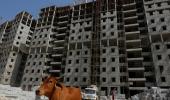If they are made accountable, bad loan cases will shrink dramatically, recoveries will rise, and the NCLT process will be more manageable, suggests Debashis Basu.

More than two years ago, I wrote about the case of C&C Towers Ltd (CCTL), which had signed a 20-year concession agreement with the Greater Mohali Area Development Authority (GMADA) in April 2009 for an inter-state bus terminal (ISBT), three multi-storey towers with retail and office spaces, a multiplex, a five-star hotel, a banquet hall, hypermarkets, and a helipad on top of one of the towers.
The project turned bankrupt and went into liquidation, and was admitted for debt resolution.
On October 19, the Chandigarh Bench of the National Company Law Tribunal (NCLT) passed an order which, once again, shows how scandalous the whole process of bank lending to debt resolution is, despite grand claims that the Insolvency & Bankruptcy Code (IBC), launched in 2016, would lead to a significant change in bankruptcy resolution.
Consider the case of CCTL. The October 19 NCLT order said against an admitted claim of over Rs 579 crore, the resolution plan could provide for only Rs 81.5 crore, or just 14.08 per cent.
Commenting on the meagre recovery a bankruptcy expert said: "I have not come across such loot in an urban infrastructure project."
How did this happen? The same way thousands of other projects have been bankrupted: Collusion between bankers and borrowers.
The moment CCTL bagged the large multiplex project, it immediately gave an advance of Rs 110.78 crore as pre-construction advance and Rs 63.30 crore as mobilisation advance to a group company, C&C Construction Ltd (a listed firm which is also bankrupt).
As always, a bunch of publicM sector banks sanctioned money in November 2010.
CCTL also collected Rs 490 crore from 400 property buyers.
Construction was inordinately delayed, leading to the GMADA issuing termination notice in April 2016 and invoking bank guarantees of Rs 11.90 crore.
A corporate insolvency resolution process (CIRP) started on October 10, 2019.
Daylight robbery
The initial aggregate claims of all creditors admitted were Rs 580.12 crore while capital work in progress was put at Rs 399.89 crore.
However, the actual allocation to the creditors (fixed deposit holders, allottees, the GMADA, statutory dues, etc) under the resolution plan turned out to be just 14.05 per cent.
What were the bankers doing? What were the engineers of the GMADA doing? The answer is crystal clear in all such bankruptcy cases (especially in real estate involving public-sector banks), but it is one that we don't want to see: Rampant fraud and corruption by everybody involved.
Consider these details of related-party transactions.
CCTL had extended an advance to the extent of 35 per cent of the contract price to C&C.
The transaction auditor has pointed out that the general business/industry practice is to advance 15 to 20 per cent of the contract value.
As much as Rs 25.93 crore of the advance is still unadjusted against construction.
CCTL had also made an excess payment of Rs 40.87 crore to C&C over and above the bills and mobilisation advances allowed.
No lender approval had been sought for this payment, said the NCLT order.
According to the terms of the contract, CCTL had the right to impose and levy liquidated damages of 0.25 per cent of the contract value per week or part of a week, a maximum of up to 5 per cent of the total contract value, ie Rs 15.82 crore in the case of default by the contractor (C&C).
The work was scheduled to be completed within 18-30 months from December 16, 2009, for the ISBT and the hotel & commercial complex.
Despite inordinate delay, CCTL has not imposed liquidation damages on C&C.
When the IBC was operationalised, there were strident assertions that it would lower bad debt and lead to a faster resolution.
Some even hoped for significantly higher recoveries.
I have argued many times since 2016 that these are false expectations.
The fact is that creditors have only been able to realise 17 per cent of their claims through the IBC process.
A reply to a Right to Information query reveals that the government has written off Rs 10.41 trillion as bad loans since 2014.
The reason for this is rampant fraud and corruption involving public-sector banks, leading to IBC cases.
Fraud is pre-planned so that there is very little realisable value.
The CCTL promoters crafted a contract to drain substantial amounts of money and got away with it.
The bankers and 'independent engineers' of the GMADA did not monitor the project and did nothing to prevent money from being drained off to group companies.
They are primarily responsible for this fraud, but they too got away.
CCTL is an example of my central point about the IBC, which I have repeatedly made since 2016: The source of humungous bad loans that are written off periodically has nothing to do with poor bankruptcy laws, as claimed by bankers, such as Arundhati Bhattacharya, former State Bank of India chairperson.
Yet, there is widespread opposition (even articulated by former Reserve Bank of India governor Raghuram Rajan) to criminal action against bankers because they would like to label these normal 'business failures'.
Meanwhile, the resolution process itself is a big mess.
Orders are arbitrary and contradictory. All cases are way behind deadlines.
The Supreme Court even had to issue notices to two members of the National Company Law Appellate Tribunal in possible contempt proceedings against them, for ignoring its instructions and pronouncing a judgment in a Finolex Cables case.
The root cause of all this mess lies with public sector banks.
If they are made accountable, bad loan cases will shrink dramatically, recoveries will rise, and the NCLT process will be more manageable.
Strangely, the government seems uninterested in fixing the way banks work.
Debashis Basu is editor of moneylife.in and a trustee of the Moneylife Foundation
Feature Presentation: Aslam Hunani/Rediff.com











